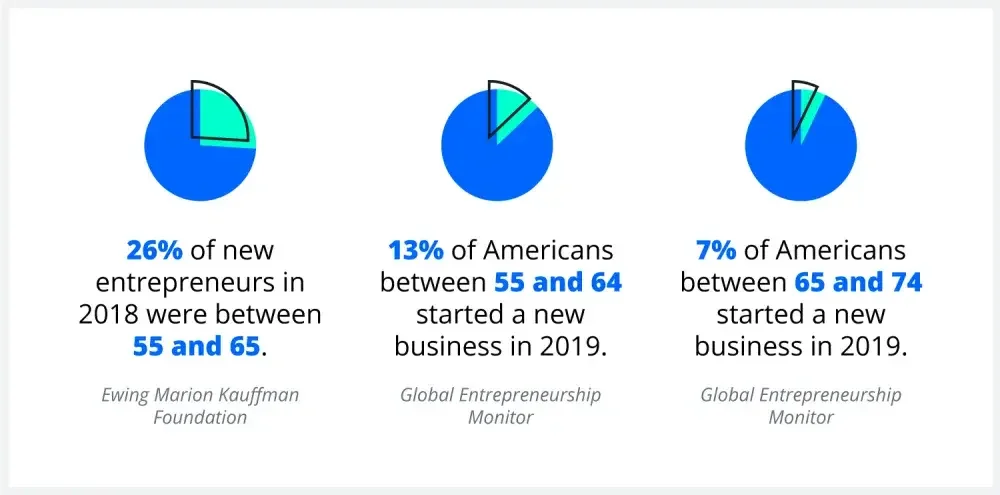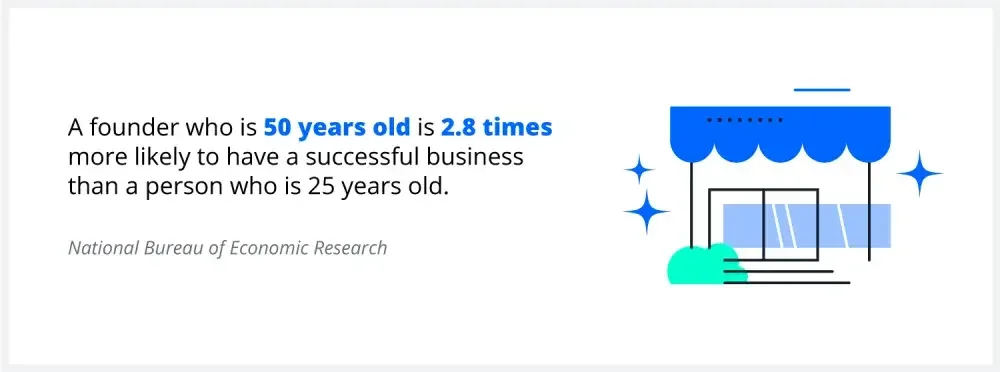The average retirement age in the U.S. sits at around 63 for women and 65 for men, according to Boston College's Center for Retirement Research.
But a growing number of Americans continue to work well past the average retirement age. The U.S. Bureau of Labor Statistics estimates that the number of workers between the ages of 65 and 74 grew 4.5% each year between 2014 and 2024, compared to an annual growth rate of less than 1% in all age groups younger than 65.
Many Americans who retire even choose to unretire. The nonprofit RAND Corporation found that roughly 40% of workers over 65 had previously retired but decided to return to the labor force.
If you want to continue working into your retirement years, but you've had enough of working for someone else, you might try starting a business. We've put together several unique retirement business ideas and outlined how much they might cost to start and what level of involvement you might need to sustain your business.
Why start a business in retirement?
Emerging entrepreneur statistics show that the landscape is changing. A good chunk of Americans between the ages of 55 and 64 (13%) and between the ages of 65 and 74 (6%) started new businesses in 2019, according to the Global Entrepreneurship Monitor.
They did so for various reasons. Among those between the ages of 55 and 64, most (64%) formed businesses to make a difference in the world. Among those between the ages of 65 and 74, most (55%) did so to build wealth. Many Americans in each age bracket also formed businesses to make a living because jobs were scarce or to continue a family tradition.
Let's explore some of the best retirement business ideas, whether you want to work from home or get out into your community.
Home businesses for retirees
In many cases, all you need is a good website and a lot of passion to launch an online business from home. Whether you want to sell handmade goods or ship other people's goods, there are plenty of fulfilling and potentially lucrative business ideas for retirees.
Dropship goods
Dropshipping is an online business model—commonly run as a sole proprietorship—that involves selling products to customers online without actually holding onto the products. You're responsible for creating a website, selecting products to sell, marketing your products, and choosing your prices. Once a customer orders from your online store, you send the order to a dropshipping supplier that prepares the order and ships it to your customers.
You can find dropshipping suppliers through online platforms like Oberlo. The key in dropshipping is to find products that are in high demand or might be in the future and to choose sustainable profit margins. If you've always wanted to run an online store but don't want to handle the fulfillment logistics, you might want to explore dropshipping further.
- Potential income: $1,000–$2,000 per month (Shopify)
- Time commitment: 10–15 hours per week
- Startup costs: Website; marketing
Write a newsletter
Personal email newsletters have exploded in popularity in recent years. For example, Substack—a startup that allows you to build, distribute, and monetize newsletters—doubled its readership and its total number of newsletters since the COVID-19 pandemic began.
The concept is pretty simple: You choose a topic that you're interested in and think others might enjoy as well—maybe it's bird watching or knitting—and you write a newsletter about it. Generally, people distribute their newsletters for free for a couple of months, build up an audience, and switch to a subscription model with a monthly fee (typically anywhere from $5 to $25 or more). Platforms like Substack will claim a 10% slice of your revenue after you monetize.
- Potential income: $6,300 per month (with a $10 subscription fee and 800 subscribers, after paying Substack's fees)
- Time commitment: 20+ hours per week
- Startup costs: Marketing
Become a virtual assistant
Many small business owners and entrepreneurs rely on virtual assistants to keep their costs down. Virtual assistants might schedule meetings or projects, make phone calls, input data, create spreadsheets, or even help with writing or graphic design tasks—all from their homes.
You might connect with people who need virtual assistants through freelancing platforms like Upwork, or you might form your own virtual assistant business and market yourself based on your specific skills.
- Potential income: $1,518 per month (based on Indeed's estimated average hourly wage of $18.97)
- Time commitment: 20 hours per week
- Startup costs: Marketing
Offer freelance services from home
For those who worked in industries with services that can easily be freelanced, such as graphic designers, programmers, or writers, offering freelance services is an easy way to continue to work within the industry you built a career in. Join online communities of freelancers, such as Upwork, to offer services such as blog or website writing. Or, start a website for in-demand services you can do online, such as bookkeeping or graphic design.
- Potential income: Varies depending on the industry (Glassdoor, hourly by industry)
- Time commitment: Varies depending on desired commitment
- Startup costs: Website; marketing
Create online courses
If you have knowledge to share from your previous work experience but don't want to work closely with clients, creating and selling online books or courses is a good way to impart knowledge and earn an extra income. Build a website and map your knowledge to information products, such as ebooks and training videos.
- Potential income: Varies depending on cost per product
- Time commitment: Varies
- Startup costs: Website; marketing
Longevity economy business ideas
The so-called “Longevity Economy" includes all of the goods and services geared toward Americans over 50. And it's pretty massive. Oxford Economics and AARP estimate that it's responsible for more than $7 trillion in economic activity each year in the U.S. That number's expected to grow to $13.5 trillion by 2032—more than half of America's GDP—as the proportion of adults over 50 continues to increase year over year.
This presents many interesting ideas for retirees looking to form businesses and solve problems for their peers.
Specialize in aging-in-place consulting
As the population continues to age, many Americans have turned to experts to help them redesign their homes with safety and functionality in mind and make recommendations on how to live more independently.
There are various certifications you can receive to become an aging in place specialist, and you can focus on the design and remodeling aspects of the job or the life coaching and independent living aspects.
- Potential income: $5,164 per month (PayScale)
- Time commitment: 40 hours per week
- Startup costs: Certification and training; website; marketing
Become a senior concierge
Senior concierges might help with scheduling appointments, grocery shopping, planning an event, going to the post office, mowing the lawn, walking a dog, waiting at someone's home for a scheduled service appointment, or really any everyday task. Some senior concierges also complete home wellness checks.
- Potential income: $2,925 per month (Glassdoor)
- Time commitment: 40 hours per week (or less)
- Startup costs: Website; marketing
Offer senior-specific nutrition consulting
For those retiring from the health field, such as nutritionists, nurses, or physical therapists, specializing in senior-specific nutrition consulting is an easy way to draw upon your knowledge and help your peers. Partner with gyms and fitness centers near your home to offer specialized services to those 60 and older, or set up a website and market your services to individual seniors looking for advice. You may need to go through a program to become a certified nutritionist.
- Potential income: $25/hour (ZipRecruiter)
- Time commitment: Varies depending on desired commitment
- Startup costs: Website; marketing
Other retirement business ideas
Retirees as a whole are an enterprising bunch. According to the Bureau of Labor Statistics, the unincorporated self-employment rate for Americans who are 65 and older is 16%. That's significantly higher than the rate for all other age groups, which rests below 10%. Here are some additional retirement business ideas.
Lease plants
If you've always had a green thumb, you might try tapping into the robust network of businesses and homeowners that lease plants instead of owning them. Under this business model, you select appropriate plants for different spaces and collect a monthly fee for watering and pruning the plants and responding to any plant emergencies.
- Potential income: Up to $225 per month per client (Shopify)
- Time commitment: Varies
- Startup costs: Training course; plants, website; marketing
Become a life coach
As a senior, you have wisdom to share. Make money by drawing upon your experiences as a life coach. In this role, you can help guide members of the younger generation with advice you've gained throughout your life. Use knowledge from your previous job by becoming a business coach, or share insight in broad strokes as a more general life guide.
- Potential income: $29 per hour (ZipRecruiter)
- Time commitment: Varies
- Startup costs: Website; marketing
Start a tutoring business
If you're a retired teacher or educator, a tutoring business is a perfect way to use your skills to make a side income. Start a business from your home or work through online tutoring companies, such as Tutor.com and Care.com. Since you can create your own schedule, tutoring is perfect for retirees looking to make additional income while keeping the flexibility of retirement. Depending on your skill set, you can tutor a specific subject or help students prep for college entrance exams.
- Potential income: $10–$25 per hour (AARP)
- Time commitment: Hourly sessions; uptick of demand for test prep in the Spring and Fall
- Startup costs: Marketing; supplies
Be an independent consultant
Consulting is another way to use your previous experience to make extra income in retirement. As a consultant, you can share the knowledge you've gained within your specific industry with individuals looking for mentors, or businesses looking for help. The time commitment for this job varies depending on the scale of the consulting business you want to start; you can work on the weekends, or as a more full-time position.
- Potential income: $40 per hour (ZipRecruiter)
- Time commitment: Varies
- Startup costs: Website; marketing
Sell goods online
Monetize new hobbies you've picked up in retirement by selling goods online. Are you crafting or baking? Perhaps you've taken up woodworking in retirement, or you're making jewelry. You can earn money online by selling your pieces on sites like Etsy. This side hustle is perfect for retirees who want to earn extra cash without pivoting too far back into the working world.
- Potential income: Dependent on cost of goods
- Time commitment: Varies
- Startup costs: Marketing; supplies
Once you've left the workforce, there are a number of ways to continue making an income. From monetizing your new retirement hobbies as a side hustle to creating a full-time consulting business, there's no shortage of retirement business ideas that allow you to generate income and draw upon your skill sets.
If you want to start a business in retirement, we're here to help. No matter what business structure you're looking at—from a sole proprietorship to an LLC—our business formation resources are here to guide you through.
Sources: Boston College | U.S. Census Bureau | RAND Corporation | Global Entrepreneurship Monitor | Oxford Economics | Kauffman | Schoders | TransAmerica | Merrill Lynch | National Bureau of Economic Research | Business Insider




